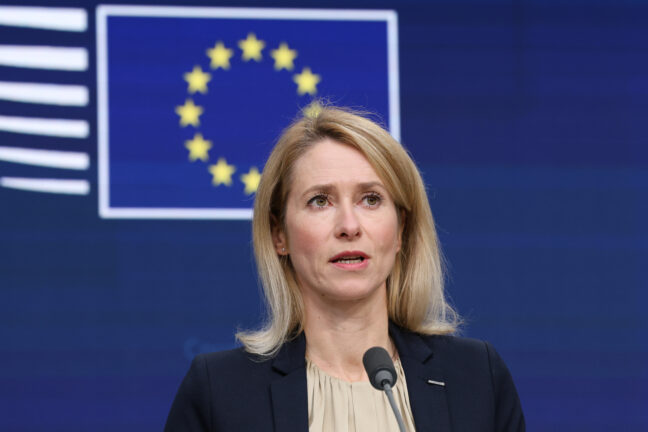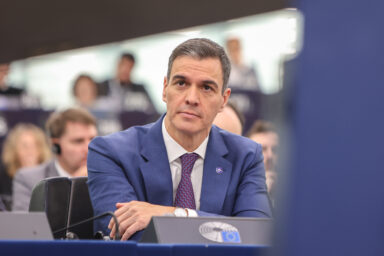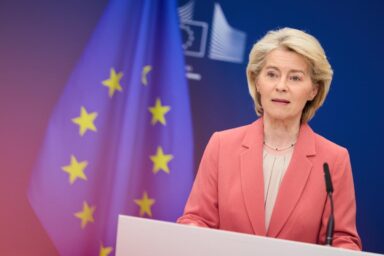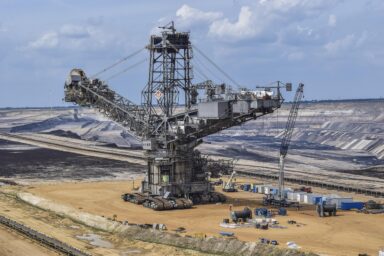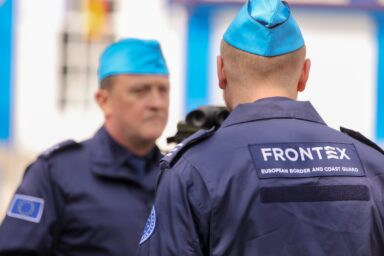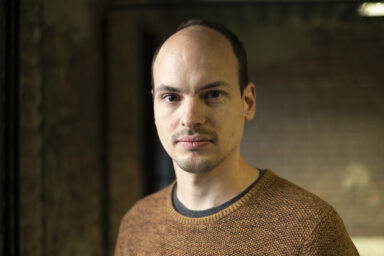EU foreign ministers gathered in Brussels on Thursday for a highly charged meeting of the Foreign Affairs Council, with Ukraine once again dominating the agenda amid growing unease over reports of a new US–Russia “peace plan” circulating – without European or Ukrainian involvement.
“So we have a very packed agenda today,” is how the EU High Representative Kaja Kallas opened her doorstep comments, underscoring not only the bloc’s continued commitment to Ukraine but also its focus on other crisis zones including Gaza and Sudan.
On Ukraine, she said ministers would examine further action against Russia’s so-called shadow fleet, which continues to facilitate revenue flows sustaining President Putin’s war effort.
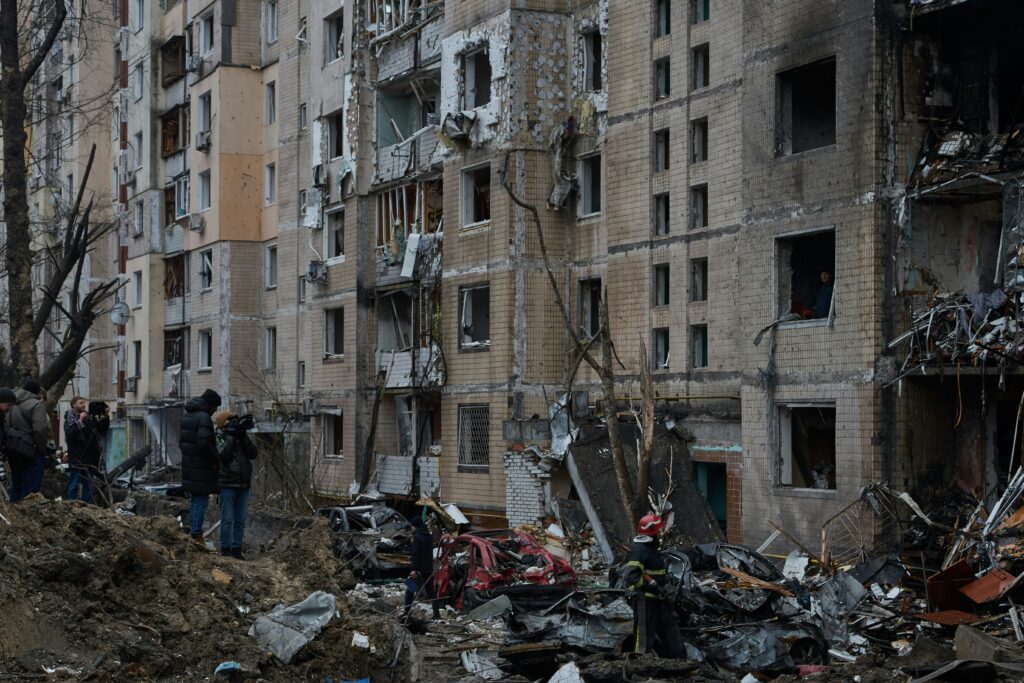
High Representative on US–Russian ‘plan’
Ms Kallas also alluded to what she called “recent news” – a purported 28-point framework drafted by Russian and US officials, first reported by Axios. The partially leaked details have triggered alarm, not least because they reportedly mirror several of the Kremlin’s long-standing maximalist demands: Russia expects Ukraine to surrender not only some occupied territories but potentially the entire Donbas, while also accepting future — reportedly severe — limits on its armed forces and a ban on the presence of foreign troops providing assistance.
For many EU officials, any proposal drawn up without Kyiv – and without the EU – is likely to have little credibility. Ms Kallas repeated what has become a consistent European position:
You might be interested
“What we as Europeans have always supported is a long-lasting peace and just peace and we welcome any efforts to achieve that.” But she stressed that legitimacy requires those directly involved.
“Of course, for any plan to work, it needs Ukrainians and Europeans on board … in this war we have to understand there is one aggressor and one victim and we haven’t heard of any concessions on the Russian side. If Russia really wanted peace, it could have agreed to an unconditional ceasefire some time ago. Instead, what we saw was the bombings of civilians. Ninety-three percent of Russian targets have been civilian structures: hospitals, schools, apartment buildings, to really kill a lot of people and cause as much suffering as possible.”
There is one aggressor and one victim and we haven’t heard of any concessions on the Russian side. – Kaja Kallas, High Representative of the Union for Foreign Affairs and Security Policy
No peace without Ukraine, ministers warn
Her warning was echoed by several ministers, on arrival. Denmark’s Lars Løkke Rasmussen, whose country holds the EU presidency at the moment, stressed that “as always” the EU was fully committed to peace in Ukraine. He said he was looking forward to hearing directly from Ukraine’s foreign minister, Andrii Sybiha.
“That is a high priority for me as a Dane, given that we also hold the European presidency this year (…) I have listened to the rumours about ups and downs but want to emphasise that you can’t bring peace to Ukraine without the Ukrainians and the Europeans.”
Czechia’s foreign minister Jan Lipavský shared Denmark’s commitment, warning sharply against any deal without Ukrainian input and agreement.
“I am expecting a traditional discussion including the aggression against Ukraine and Europe and think it will be influenced by information we are hearing from yesterday about a US–Russian plan, which is allegedly about Ukraine without Ukraine, which is something Czech diplomacy resolutely stands against.”
Italy’s foreign minister, Antonio Tajani, underscored the legal and political complexities facing the EU as it seeks new tools to support Kyiv. “The important thing now is to find a solution regarding the use of frozen Russian assets. We support Ukraine, but we need to identify the legal basis that allows for this decision.”
Ongoing questions about alleged Russian sabotage activities, including a serious recent incident on a Polish railway line, have further underscored for ministers that the war in Ukraine is inseparable from wider European and NATO security.
Beyond Ukraine: Gaza and Sudan on the agenda
Meanwhile on Thursday, Ukraine was only one part of an agenda shaped by multiple, overlapping crises or critical situations.
Ministers were also due to assess the situation in Gaza, where the ceasefire is now in place but problems continue. Aid agencies report that, despite improved access in some areas, shortages of food, clean water and shelter remain acute. Sporadic Israeli strikes have rattled what remains a fragile truce. The Council also expected an update on Sudan, where intensifying fighting and mass displacement continue to destabilise the region and complicate relief operations.
With this wider backdrop, ministers entered the day’s discussions under pressure to produce not just reaffirmations of principle but concrete steps.
This set the stage for the afternoon press conference, where the High Representative outlined what—if anything—had moved forward behind closed doors, and how the EU intended to operationalise its positions.
Maintaining the course on pressure and support
After the press conference, Ms Kallas took questions. Describing the FAC (Foreign Affairs Council) meeting as “intense as usual” she said that the EU’s position hadn’t changed and reiterated that if Russia really wanted peace, it would have accepted an unconditional ceasefire in March. And she contrasted, again, talk of peace with what was happening on the ground.
“The brutal reality is that 26 Ukrainian civilians were killed in Russian attacks yesterday. Russia has repeatedly paid lip service to peace talks and previous talks fell apart because Russia never made any real commitments. The pressure must be on the aggressor, not on the victim. Rewarding aggression will only invite more of it.”
She went on to explain the EU’s two-point plan:
“The first is to weaken Russia. The second, is to support Ukraine. The head of the European intelligence centre and the sanctions envoy briefed on the impact of sanctions. The data is very clear: the export of Russian crude oil is the lowest it has been in months, Russian tax revenues from oil are the lowest since the war started. Sanctions are hitting Russia hard and more are to come. Going after Russia’s shadow fleet remains a priority.”
Pushing the shadow fleet into the light
Ms Kallas said that what more could be done had been discussed to curb the shadow fleet and legal ways to slow it down. She also said that many ministers had raised the issue of financial support, with the reparations loan, she said, “being the most clear-cut way to sustain Ukraine’s defence.
“It is also a way of showing Russia that time is not on their side,” adding that supporting Ukraine was “a bargain compared to the cost of a Russian victory”.
Also discussed were hybrid attacks like the sabotage in Poland, before turning to Gaza.
On Gaza, she called the United Nations resolution for an international stabilisation force a “game changer”. She said ministers had discussed the situation and said peace depended on Hamas not having a role while international partners did. “EU staff are already working on humanitarian issues and today we discussed expanding the broader monitoring mission in Rafah to other crossing points,” she said. She added that she was meeting the Palestinian Prime Minister Mustafa later Thursday to discuss European support and Palestinian Authority reforms and mentioned an important meeting with ASEAN ministers also that day, over lunch.
The reparations loan shows Russia that time is not on their side. – Kaja Kallas, High Representative of the Union for Foreign Affairs and Security Policy
Questions from the press
But it was to Ukraine that journalists turned to first, in the question period that followed, including the reparations loan. Ms Kallas again:
“I think Russia are afraid of the reparations loan. They are coming to a point when they are running out of money. They want to show on the outside that they are ‘super’ strong but this is not the case. Again, I think this gives us the reason to be strong, to maintain the course and support Ukraine and pressure Russia.”
For now, the centre of gravity remains on how the EU can sharpen pressure on the Putin regime while sustaining Ukraine’s defence and overall resilience. There is no question urgency is needed and currently hangs most over the reparations-backed loan: will they or won’t they give it the green light?
As one journalist at the event wondered aloud, would such a loan even be necessary (in other words, if the so-called peace proposal saw actual daylight)? It sounded, however, far more like wishful thinking than a credible prospect.
